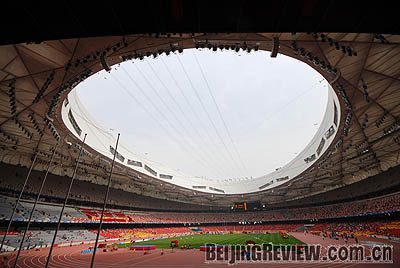|

GRAND ARENA: The China Track and Field Open 2008 takes place on May 22 in the Bird's Nest (WEI YAO)
For many Olympic fans the Water Cube is a familiar name. It vividly describes the appearance of the National Swimming Center: cubic, and covered by what look like water bubbles.
Now, Water Cube is not only the name of an Olympic venue, but also a brand of potable water. On June 3, Water Cube Natural Glacial Water went on sale, after paying for the privilege to use the swimming center's name. The glacial water was the first, but won't be the last, commercial use of China's Olympic venues.
"The National Swimming Center had already taken the after-game operation of the venues into consideration as early as 2003, in order to relieve the burden of maintaining them on the government and society," said Kang Wei, Chairman of the center's board of directors.
Water Cube glacial water comes from the glaciers of northern Canada. It is the first step in developing more products under the Olympic venue's brand name. After the Olympics the Water Cube will become a multi-functional center that integrates sports training, cultural entertainment and leisure activities.
How to make use of the Olympic venues so as to get back the large amount of investment that has been put into them, has long been a headache for the host cities. So far, all the Olympic venues in Beijing have been completed. After the closing ceremony of the Olympics the venues will face the risk of being left empty and useless.
"Just relying on the fame of the Olympics can hardly support further development of Beijing Olympic venues," said Chen Lin, Director of the Consultancy Center of Beijing National Sports Group, a company that has rich experience in sports industry development. In 2006, they set up an after-game operation plan for the Water Cube.
The post-Olympic function of the Water Cube, which occupies 60,000 square meters, will be very different from its initial purpose. Most of the 17,000 seats will be removed to leave room for a two-story building of more than 10,000 square meters filled with entertainment facilities. Commercial space will then take up 30 percent of the space inside the venue.
The Beijing Municipal Government has also taken into consideration how to make use of Olympic venues after the Games. That is why some venues were located inside university campuses.
The government also introduced new forms of financing and operation of the venues, opening construction to tender, with the winning company in charge of the financing, design, construction and operation. The winning companies were also given preferential treatment to encourage tenders. For example, the company that won the bid to build the National Stadium and the Olympic Water Park will enjoy 30 years of franchising of the venues after the Olympics.
As for the Bird's Nest (National Stadium), the government paid for 52 percent of the project and transferred operation of the venue to the tender winner. Zhang Hengli, Vice General Manager of the National Stadium Co. Ltd., said that after the Olympics the Bird's Nest will focus on large cultural and sporting events, and make profits by establishing commercial infrastructure, selling advertisements and other activities. The commercial area will occupy 35 percent of the venue's total 258,000 square meters of space.
The Beijing Olympic venues will rely mainly on sports events and cultural activities to attract people. "We have to take the sport function into consideration in the operation of the Olympic venues, but this function can not make direct profits," said Zhang, "Commercial sport events will be the path we follow in the future."
Beginning in 2007, the Beijing Municipal Government began allocating 500 million yuan ($72 million) a year to support the development of sports industries, attracting more international level events to Beijing.
According to a report in House Guide, the magazine of the China Association of Policy Science, after the Olympics, some venues including the Bird's Nest will sell naming rights, allowing companies to use the venue names.
Selling the naming rights of large sports venues after the Olympics has been common in previous Olympics host cities.
"The development of intangible property is one of the main channels for large sports venues to make profits. Whether intangible property can be efficiently developed will decide the future operations of Beijing's Olympic venues," said Lin Xianpeng, Director of the Sport Economy and Industry Teaching and Research Division of Beijing Sport University.
For China, turning sports venues into business brands will be a new thing. "Both domestic and foreign enterprises will compete for the right to name their products Bird's Nest, and we will carefully choose a winner," said Zhang.
Developing the tourism and exhibition business is also an effective way to make use of the venues. Beijing has gradually grown as an international exhibition center. With this in mind the potential for staging exhibitions was thought about at the design stage of each Olympic venue. According to plans, Beijing will build a district around the Olympic Park aimed at attracting exhibitions, sports events, cultural shows and tourism. |